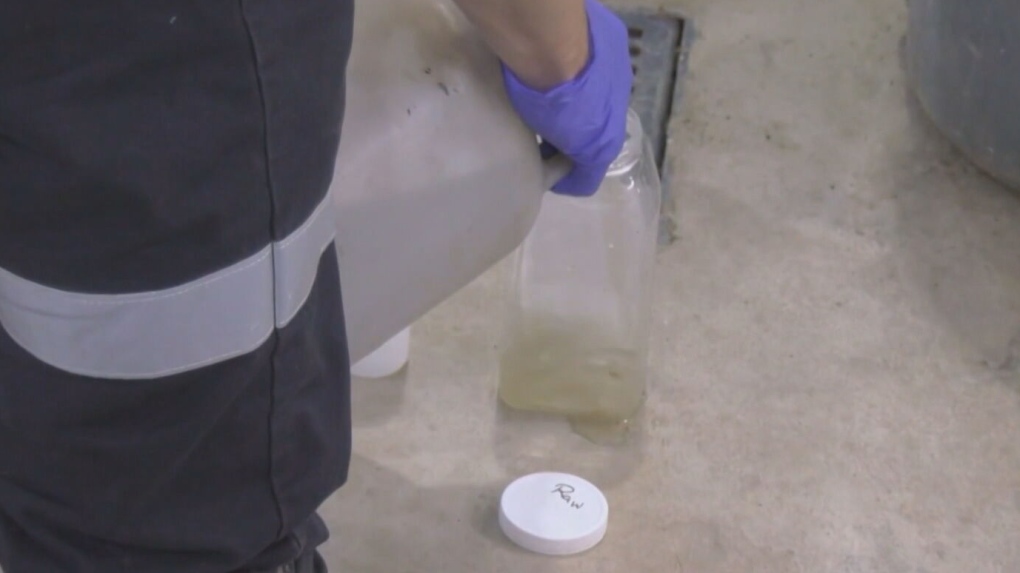UW researchers using engineered bacteria to breakdown harmful microplastics in wastewater
Researchers at the University of Waterloo are using genetically-modified bacteria to breakdown harmful microplastics in wastewater.
Lead researcher, Aaron Yip, started the work in 2022, hoping to find innovative ways to remove plastic pollution from the environment.
“Without of any interventions, plastics would likely last over 100 years,” he said.
The team used wastewater samples from the Region of Waterloo to develop the genetically-modified bacteria.
 A sample of wastewater being taken in this undated file photo.
A sample of wastewater being taken in this undated file photo.
“We took a bunch of different parts, different genetic parts you can call them, and we assembled them together and then essentially put that complete set of instructions into our lab strain of bacteria,” Yip explained. “These are just like our friendly lab bacteria, and then we use that lab bacteria to deliver a set of instructions into the wild bacteria.”
The team’s modified bacteria could help with microplastic decomposition before they even enter the environment.
Microplastics come from a variety of sources.
“Typically, from things like synthetic clothing for example, those are some of the main contributors to microplastics in wastewater,” Yip said.
The team’s focus was polyethylene terephthalate (PET), which is commonly found in food and drink containers.
“We used in our project the container that would hold oregano, and we saw that by putting that container in proximity to these bacteria, you’d get full degradation of that plastic,” explained chemical engineering professor Marc Aucoin.
Chemicals found in plastics are associated with insulin resistance, cancer and decreased reproductive health.
“There are health impacts with consuming these microplastics that end up in organisms that get eaten up by fish, that get eaten by us, that we drink through our water,” said Aucoin. “To eliminate any of those health effects, we want to get rid of those microplastics.”
Researchers are still assessing the risks of using a modified bacteria in a natural environment, before the team takes their work beyond the walls of the Waterloo lab.
CTVNews.ca Top Stories

Thousands of structures destroyed in L.A. County's most destructive fire
A series of wildfires tore through densely populated parts of the Los Angeles, Calif. area. Five people have been reported dead. U.S. Gov. Gavin Newsom said thousands of resources have been deployed to contain the fires.
Is the Hollywood sign on fire?
As fires scorch Los Angeles, fake images and videos of a burning Hollywood sign have circulated on social media.
U.S. Supreme Court rejects Trump's bid to delay sentencing in his New York hush money case
A sharply divided U.S. Supreme Court on Thursday rejected president-elect Donald Trump's final bid to put his New York hush-money case on hold, clearing the way for him to be sentenced for felony crimes days before he returns to the presidency.
Ex-Trump adviser says Canada in 'difficult position' amid tariff threat, Trudeau resignation
In the face of a potential tariff war, U.S. president-elect Donald Trump's former national security adviser John Bolton says 'Canada is in a difficult position' in part due to Prime Minister Justin Trudeau's resignation and a looming general election.
PM Trudeau says he thinks Trump is using talk of Canada becoming 51st state to distract from tariff impact
Prime Minister Justin Trudeau says he thinks U.S. president-elect Donald Trump is drumming up drama on Canadian statehood to detract from tariff talks.
Canadian travellers now require an ETA to enter U.K. Here's what to know
Starting Jan. 8, Canadians visiting the U.K. for short trips will need to secure an Electronic Travel Authorization (ETA) before boarding their flight, according to regulations set out by the U.K. government.
'True when I said it, true today': former Canadian PM Harper pushes back against Trump on social media
Former prime minister Stephen Harper doesn’t find U.S. president-elect Donald Trump’s jibes about Canada becoming the 51st U.S. state very amusing.
Poilievre says the next Canadian election will be about the carbon price
Pierre Poilievre returned to Ottawa on Thursday after the holidays with a familiar demand for Justin Trudeau: call a carbon-tax election.
More than 150 students sick at University of Guelph, says public health
More than 150 cases of gastroenteritis have been reported at the University of Guelph.

































